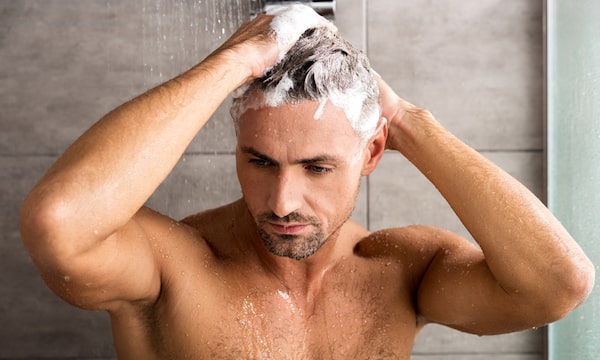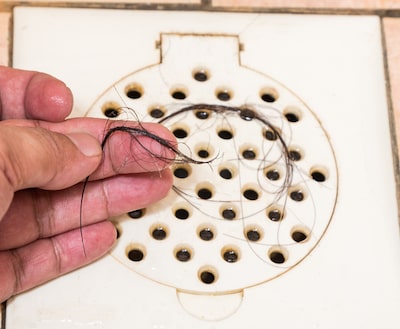Hair Loss in the Shower – Should You be Worried?

One possible sign of balding that often worries people of all ages is the appearance of hair in the drain after a shower. Even though everyone will see hair loss of about 100 hairs on a daily basis, it is still an issue that worries some people when they are stepping out of the shower. If you fall into this category, take a look below to learn why hair loss happens in the shower and whether or not you should be worried about this issue.
Hair Growth Phases Examined
There are multiple stages of hair growth that you should know about:
- Anagen – This is known as the growth phase and it can last anywhere from one to six years
- Telogen – This is the resting phase and it generally lasts anywhere from four to six weeks
The scalp hair spends the majority of its time in the growth phase. When a person loses a hair as it enters the resting phase, the hair follicle will “go to sleep” and the hair shaft will fall out. This is not a cause for concern as this process is always followed by another hair starting to grow from that same hair follicle. Since the hair that is starting to grow is normally a very small hair, you should not mistake it for miniaturized hair that results from the balding process.
The hair growth phases listed above can account for some of the daily hair loss experienced by a person.
Additional Causes for Hair Loss in the Shower
- Stress in Your Life – Sudden stress if your life can lead to hair loss along with a thinning condition known as Telogen Effluvium. This condition happens when stress forces a large amount of hair roots to enter the resting stage prematurely. The amount of stress can be related to psychological stress, severe illness, giving birth and thyroid issues.
- Patchy Hair Loss – If the hair loss you are seeing in the shower is in patchy areas on the scalp, this might be a sign of the autoimmune disease known as Alopecia Areata. An autoimmune disease means the immune system is mistaking parts of the body as being “foreign” in nature. In Alopecia Areata, the white blood cells will gather around the hair follicles where they are viewed as being “foreign” objects. In turn, this can cause the hair to fall out of the scalp and create bald patches.
Is it Time to Contact a Doctor?
If you are worried that the hair loss happening in the shower is more than the average daily amount of hair loss people can expect to experience, it might be time for you to contact your doctor.
For example, take a good look at the hair loss pattern you are experiencing. If the areas of hair loss are located all over your head (as seen in Telogen Effluvium), this could be an indication of a hair loss issue that needs to be addressed. If the hair loss is patchy in nature (as seen in Alopecia Areata), you should contact a board-certified doctor experienced in treating hair loss.
Ways to Lessen Hair Loss in the Shower
 Reduce Your Stress – Finding ways to relax can help you reduce the amount of stress you suffer from each day. Some of the common ways to reduce your stress include getting more sleep at night, exercising on a regular basis and taking time each day to spend time alone and at rest. You can also address the source of your stress and try to lessen or remove it so you will feel better and perhaps slow down the overall rate of your hair loss.
Reduce Your Stress – Finding ways to relax can help you reduce the amount of stress you suffer from each day. Some of the common ways to reduce your stress include getting more sleep at night, exercising on a regular basis and taking time each day to spend time alone and at rest. You can also address the source of your stress and try to lessen or remove it so you will feel better and perhaps slow down the overall rate of your hair loss.
Follow a Healthy Diet – The body needs quite a few minerals and vitamins to grow hair and they include vitamins A and D, zinc and iron. In addition to taking these vitamins and minerals on a regular basis, be sure and eat vegetables and fruits to get a large amount of nutrients in your diet.
Be Gentle with Your Hair – Stop habits such as using strong chemicals on the hair or performing heat styling on the hair as they can increase the rate of hair loss. These habits can cause the hair to break on a regular basis. Switch to a gentle shampoo and allow your hair to dry naturally. You should also stop wearing tight hairstyles as the continuous pulling of the hair in a certain area of the scalp can cause hair loss (Traction Alopecia).
If you have any additional questions or concerns regarding the amount of hair loss you are seeing while in the shower, please contact our office today to schedule a consultation appointment. We will examine your scalp to determine the current extent of your hair loss and create a plan to prevent further hair loss and/or perform hair restoration to address the current amount of your hair loss.
– MA